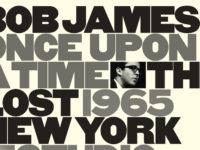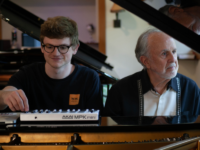Feature photo by Tom Copi
Once upon a time, there was a forward-thinking piano prodigy who made his first album in his early twenties, a wide-ranging affair produced by Quincy Jones. Soon afterwards, he composed a stridently civil rights piece that prominently featured Eric Dolphy. And then this avanteer recorded one of the first electro-acoustic experimental music recordings at the house Albert Ayler built, ESP-Disk Records.
This diversely talented musician later rose to prominence as a sideman, producer, arranger, a much-sampled funk-jazz maestro and godfather of smooth jazz. Yes, Bob James is all of these things.
There are scant recordings of Bob James during those early, avant-garde jazz days of the mid-sixties, which is why most of his contemporary fans are probably not aware of his bleeding-edge past. Other than Bold Conceptions and the absolutely wack Explosions, there’s been virtually nothing under his name until he remade himself into a jazz funkateer for the deceptively titled One in 1974. That’s why Once Upon a Time: The Lost 1965 New York Studio Sessions is such a significant new entry into James’ catalog.
In 1965, Resonance Records founder George Klabin was a freshman at Columbia University and had just acquired some recording equipment when he approached James with the idea of recording him fronting a trio in an empty concert hall, at New York City’s Wollman Auditorium. Klabin states that the original idea was for James to have the recordings for himself, not necessarily to make what could have been James’ second album. That’s a small but important point: this music was made for no audience in mind except for the artist himself. He made this music over two recording sessions more than eight months apart, and Once Upon a Time finds James maneuvering between his twin passions for straight-ahead jazz and experimental jazz.
The earlier 1965 session, from January 20, features Larry Rockwell on bass and Robert Pozar on drums. Rockwell was at the time in Sarah Vaughan’s band alongside James, while Pozar goes back with James to his college days at Michigan.
James’ lightly expressive touch — later to form the basis for his influential Fender Rhodes attack — is well apparent on the swinging “Serenata.” Pozar’s fearless drum break elicits a laugh as the three are clearly having fun. “Once Upon a Time” is a complex melody that James expertly makes sound straightforward.
“Lateef Minor 7th,” obviously a nod to jazz pioneer Yusef Lateef, begins with a bright motif but soon descends into freer, darker territory, and the strange introduction of electronic noise(!) along with spoken words. And then, unexpectedly again, the original theme rises up again to end the adventurous song. “Variations” is perhaps even further out there: another pretty motif rudely interrupted by alien electronic sounds, tape manipulations and vocal exhortations. Soon afterwards, these tracks would be heard by ESP-Disk founder Bernard Stollman, who would bring in James to record a whole record of these experimentations, becoming that second release, Explosions.
The remaining four cuts were taped October 9th, with Bill Wood on bass and Omar Clay, another Michigan and Vaughan cohort, on drums. James was in a much more mainstream frame of mind for the fall session, but as there are not many recordings of his from that vein, either, it’s still a bit of a revelation.
Starting with Sonny Rollins’ “Airegin,” this trio renders a crisp version, with the energy of a sweltering club date. James shows off pleasing, economical phrasing for the ballad “Indian Summer.” After a pretty straight take on Miles Davis’ “Solar,” the trio burrows leisurely into the blues form for “Long Forgotten Blues.”
This rarely-seen side of Bob James helps to complete the understanding of an artist far more complex and adventurous than his popular works come close to suggesting. As is clear from the short documentary above, James himself today takes pride in the chances he took as a young talent who from the start was blazing his own path. It might not be possible to decipher how this path has led to the work he’s done from the 70s onward, but the journey has certainly been a fascinating one to trace.
Once Upon a Time: The Lost 1965 New York Studio Sessions is now available on vinyl from Resonance Records, with a streaming option to follow on September 4th, 2020.




